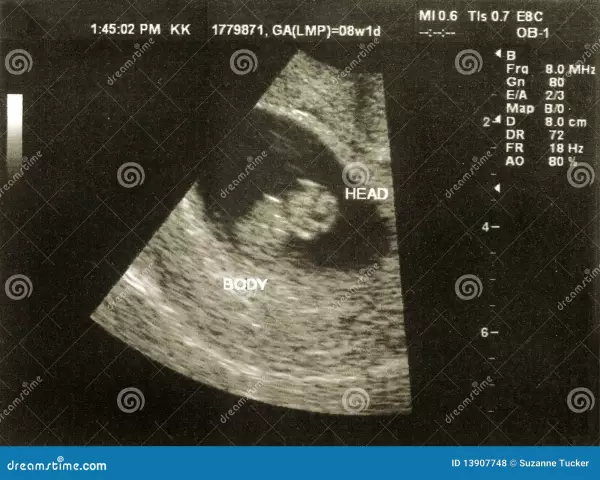- Author Rachel Wainwright wainwright@abchealthonline.com.
- Public 2023-12-15 07:39.
- Last modified 2025-11-02 20:14.
Pharyngitis during pregnancy: treatment, causes, symptoms
The content of the article:
- Causes and features of the development of pharyngitis during pregnancy
- Symptoms
- Diagnostics
- How to treat pharyngitis during pregnancy
- Video
Treatment of pharyngitis during pregnancy is one of the most urgent and important tasks both in obstetrics and in therapy and otorhinolaryngology, since the course of the disease during this period can worsen and lead to the progression of inflammation. This is due to physiological changes in the body of a pregnant woman, including immune and hormonal changes.

The course of the disease during pregnancy can be aggravated by immune and hormonal changes
Pharyngitis is an inflammation of the lining of the throat. It can be acute and chronic along the course.
Depending on the etiology, acute pharyngitis is divided into:
- viral;
- bacterial;
- fungal;
- allergic;
- traumatic.
Types of chronic pharyngitis:
- simple or catarrhal;
- hyperplastic;
- atrophic.
Causes and features of the development of pharyngitis during pregnancy
The general immune reactivity of the body during pregnancy is reduced, which is a unique mechanism for protecting fetal tissues from destruction by the mother's immune system.
Oxygen uptake progressively increases starting from the 2nd trimester of pregnancy: the growing fetus puts pressure on the diaphragm, which leads to difficulty in breathing, especially during exercise. And any decrease in lung function affects the general condition of the pregnant woman. This is one of the risk factors for the development of generalized inflammation against the background of pharyngitis.
Also, the prerequisites for the onset of the disease include:
- chronic inflammatory diseases or injuries of the nose and paranasal sinuses;
- hypothermia;
- local decrease in immunity;
- exposure to tobacco smoke;
- diseases of the gastrointestinal tract;
- the presence of carious teeth;
- chronic respiratory diseases;
- diabetes;
- avitaminosis.

One of the possible causes of the development of the disease is the herpes virus
The cause of the development of inflammation of the pharyngeal mucosa can be:
- viruses: adenovirus, rhinovirus, coronaviruses, influenza and parainfluenza viruses, enterovirus, herpes infection, cytomegalovirus, etc.;
- bacteria: staphylococci, streptococci, haemophilus influenzae, mycoplasma, chlamydia;
- mushrooms;
- allergy;
- trauma.
Most often, acute pharyngitis develops against the background of ARVI (acute respiratory viral infection). In this case, the main links of pathogenesis are:
- adhesion (adhesion) and introduction of the pathogen into the epithelial cells of the upper respiratory tract, in particular into the cells of the pharyngeal mucosa;
- the formation of intoxication syndrome and toxic-allergic reactions;
- development of the inflammatory process.
Often, due to a decrease in the immunity of a pregnant woman, bacteria join the viral infection. Also, bacteria can primarily lead to inflammation of the pharyngeal mucosa, penetrating from the environment or from a chronic focus of infection in the body. Less commonly, fungi are the cause of pharyngitis.
Symptoms
The clinical manifestations of pharyngitis during pregnancy and the effect on the fetus can vary significantly depending on the etiological factor, gestational age, the presence of concomitant diseases and the general condition of the body. In most cases, the course and outcome of the disease is favorable.
The main symptoms of pharyngitis are:
- dryness, perspiration, burning sensation, sore throat;
- dry cough;
- changing the timbre of the voice;
- difficulty in nasal breathing;
- decreased sense of smell.
With an increase in body temperature, general weakness and headache are noted.
Diagnostics
Examination of pregnant women with acute or chronic pharyngitis includes:
- careful collection of anamnesis;
- analysis of complaints and general examination;
- identification of focal infection;
- identification of concomitant diseases;
- pharyngoscopy;
- clinical and biochemical blood test;
- cytological and bacteriological examination of the discharge from the posterior pharyngeal wall.

Before prescribing treatment, you must undergo an appropriate examination.
With pharyngoscopy, the mucous membrane of the posterior pharyngeal wall is brightly hyperemic, with a pronounced vascular pattern. Inflamed lymphoid tissue may appear as red grains. Redness and swelling of the soft palate, lateral ridges and uvula are noted.
A clinical blood test can help in the differential diagnosis of viral and bacterial infections. It is also very important to monitor the hemoglobin level of the pregnant woman.
Bacteriological examination allows you to determine the pathogen and, if necessary, select or correct antibiotic therapy.
How to treat pharyngitis during pregnancy
Treatment of pharyngitis in pregnant women depends not only on the form of the disease, but also on the gestational age. First of all, it is necessary to exclude the factors leading to the occurrence of inflammation. An important role is given to the treatment of comorbidities.
Non-drug therapy means:
- physical and psycho-emotional peace;
- plentiful drink;
- refusal of spicy, sour, fried, hot, cold foods.

For pharyngitis, indoor humidifiers and air purifiers are recommended.
It is recommended to give your throat peace by refraining from long and loud conversations. Indoors, use air purifiers and humidifiers.
How to treat pharyngitis during pregnancy should be decided by a specialist.
Therapy of uncomplicated forms of pathology can be carried out at home. Gargling with sodium bicarbonate solution (baking soda), Furacilin, Chlorhexidine or Miramistin is recommended. Drops, nasal and throat sprays with sea salt work well for pregnant women.
Also, mucous membranes can be treated with a solution of Collargol or Protargol, which contain silver ions and have an antimicrobial effect. It is very important that microorganism resistance does not develop to them.
With an increase in body temperature, it is possible to take Paracetamol.

Lizobact is a local drug that is approved for use during pregnancy
Positive reviews confirm the relief of sore throat with resorption of Lizobact tablets. It is an antiseptic drug that can be used from the 1st trimester of pregnancy. Also, according to strict indications, Hexalysis can be prescribed, including in the 3rd trimester.
In bacterial pharyngitis, the drugs of choice for antibiotic therapy are protected aminopenicillins, macrolides. Before prescribing an antibiotic, the doctor determines and compares the risks and benefits. The choice of the drug depends on the alleged pathogen and the duration of pregnancy.
The indication for hospitalization is a severe form of the disease that can pose a threat to the mother and child.

With pharyngitis, it is recommended to eat properly, excluding irritating food and drinks from the diet
It is important to follow the prescriptions of your ENT doctor or therapist and regularly visit your obstetrician-gynecologist It is recommended to exclude irritating food and drinks from the diet, avoid exposure to tobacco smoke and overstrain of the vocal cords, and monitor oral hygiene.
Video
We offer for viewing a video on the topic of the article.

Alina Ervasova Obstetrician-gynecologist, consultant About the author
Education: First Moscow State Medical University. THEM. Sechenov.
Work experience: 4 years of work in private practice.
Found a mistake in the text? Select it and press Ctrl + Enter.






